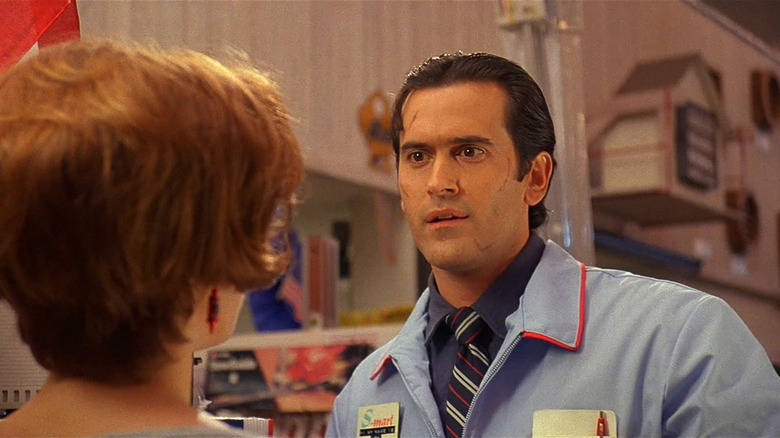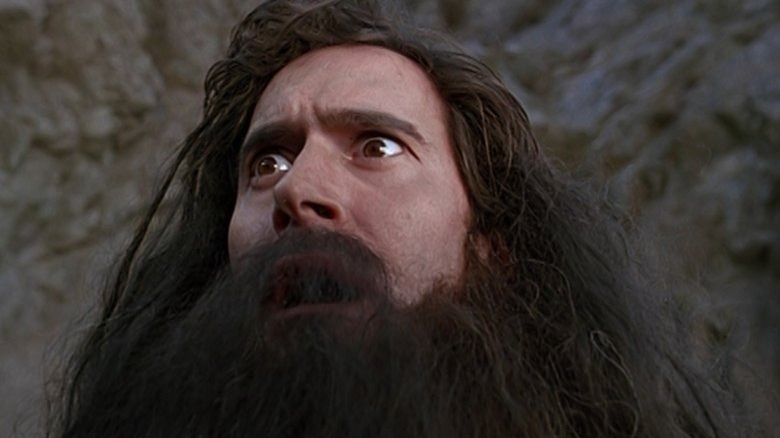Bruce Campbell Explains Why He Prefers The Army Of Darkness Original Ending [Exclusive]
We already knew that Bruce Campbell prefers the original "Army of Darkness" ending, but /Film writer Danielle Ryan recently spoke with him to learn exactly why. The different final scenes have often been the subject of debate amongst "Evil Dead" fans. For the 30th anniversary of "Army of Darkness," the /Film staff even offered their opinions on each ending.
On the one hand, there's the theatrical ending that Campbell dislikes. In the final scene, Ash returns to the housewares department at S-Mart and brags about his adventures in medieval times. When a raging Deadite unleashes hell in the store, Ash saves the day with his boomstick and plants a big, victorious kiss on his co-worker Jenny. In this triumphant moment, /Film's defense argues, "Ash fully embraces the flawed hero he was always meant to be. The threat hasn't disappeared, yet he's ready for it. It shows his growth over the course of the three films."
The alternate ending is far more ironic and depressing. The Wise Man gives Ash a magical potion to return to the present: he will advance 100 years for every drop he swallows. Unsurprisingly, Ash fumbles and miscounts. When he emerges from his hiding place looking like a wild caveman with a long, knotted beard, he realizes that he slept too long and has awakened in a post-apocalyptic wasteland.
/Film writer Debopriyaa Dutta believes the original alternate ending of "Army of Darkness" is so much better because "[t]hroughout the trilogy, Ash's cockiness always backfires, which is a thematic thread that is unceremoniously usurped by the theatrical ending." She describes the theatrical ending as "unfaithful to Ash Williams," because he only kicks ass "when thrust into tight corners," and is a bumbling, arrogant clown the majority of the time. Campbell himself shares a similar perspective.
It was more appropriate for Ash's character
Bruce Campbell told Danielle Ryan that he feels the original "Army of Darkness" ending written by Sam Raimi and Ivan Raimi was more suitable for his buffoonish and pompous character:
"Well, I always respect the filmmaker's choice because while it may not be the most popular, I think it was very appropriate. Ash is a big enough idiot to forget the amount of drops he was supposed to take. [...] It makes perfect sense for the character Ash, and it also sets up a sequel to that, which would be sort of a 'Spartacus,' 'Ash versus the robots' kind of deal. Could be a really, really cool survival, Charlton Heston, end of the world-type movie. [...] But then when we tested it, because studios always have to put forth endings that are happier, so it was deemed sort of a bummer ending, so they wanted an ending that was happier. It's okay. It's serviceable, but it's kind of silly. This ending is much more logical, actually."
Ash's clownery is his Achilles heel, made even worse by his paradoxically cocksure attitude. For Campbell, Ash is more of a court jester than a king. Since "Army of Darkness" elevates his more negative qualities, the darker ending is fitting and serves as poetic justice for his self-absorbed behavior. If the alternate final scene was kept in "Army of Darkness," it may have changed the trajectory of the "Ash vs Evil Dead" series, which features a similar apocalyptic conclusion in the final episode. Worst of all, the scene's ultimate removal robbed us of an off-the-wall, doomsday version of an "Evil Dead" movie, where Ash would have had to confront his biggest disaster yet. Now that would've been groovy.

